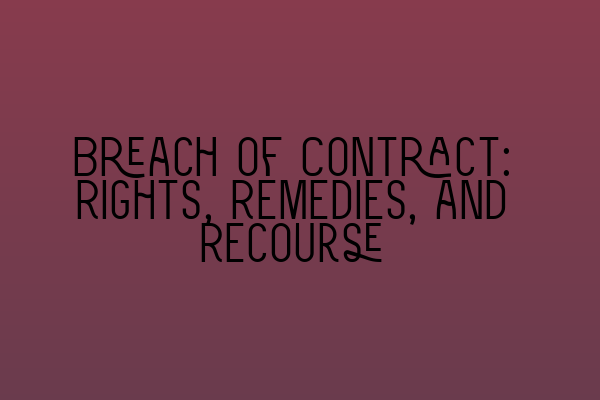Breach of Contract: Rights, Remedies, and Recourse
In the world of contracts, breaches can sometimes occur, resulting in disagreements, disputes, and potential legal action. Understanding your rights, available remedies, and possible recourse is crucial for any party involved in a contract. This article will provide valuable insights into breach of contract scenarios and guide you through the necessary steps to protect your interests.
1. What is a breach of contract?
A breach of contract occurs when one party fails to fulfill the obligations outlined in a legally binding agreement. It can take various forms, including non-performance, late performance, defective performance, or any act that undermines the purpose of the contract. When a breach occurs, the affected party may have several options to seek recourse.
2. Rights of the non-breaching party:
As the non-breaching party, you have specific rights in response to a breach. These rights generally fall into three categories: termination, damages, and specific performance.
a. Termination:
The non-breaching party can terminate the contract and be relieved of any further obligations if the breach is substantial. However, it is crucial to review the contract’s terms and conditions to determine the precise circumstances under which termination is permissible.
b. Damages:
Damages are a common remedy for breach of contract cases. These can be compensatory damages, which aim to financially reimburse the non-breaching party for losses incurred due to the breach. It is essential to calculate and present your damages accurately to ensure fair compensation.
c. Specific Performance:
In some cases, monetary compensation may not be sufficient to remedy the breach. Specific performance may be sought, compelling the breaching party to fulfill their obligations as outlined in the contract.
3. Remedies available to the breaching party:
The breaching party may also have certain rights and available remedies, depending on the circumstances. These remedies can include cure, counterclaims, or affirmative defenses.
a. Cure:
The breaching party may be given a reasonable opportunity to cure the breach, meaning they have a chance to rectify their non-performance or defective performance. This allows the contract to continue as intended, avoiding potential legal consequences.
b. Counterclaims:
The breaching party may assert counterclaims against the non-breaching party, citing their failure to perform or uphold their own obligations as a defense. This can mitigate the damages sought by the non-breaching party or shift the balance of responsibility.
c. Affirmative Defenses:
Affirmative defenses, such as lack of capacity, mistake, duress, or undue influence, can provide justifications for the breaching party’s actions. These defenses aim to refute the non-breaching party’s claims and protect the breaching party’s interests in the contract dispute.
4. Steps to take in case of a breach:
In the event of a breach of contract, following a systematic approach is essential to protect your rights and increase your chances of a favorable outcome. Consider the following steps:
a. Review the contract:
Thoroughly review the terms and conditions of the contract to assess the nature and extent of the breach. This will help determine the appropriate course of action and your potential remedies.
b. Gather evidence:
Collect any relevant documentation, communication records, and other evidence that support your claim of breach. This evidence will strengthen your case and assist in the negotiation or litigation process.
c. Communicate with the breaching party:
If feasible, attempt to resolve the dispute through direct communication with the breaching party. Express your concerns, state your rights, and propose potential solutions to mitigate the breach. This may involve mediation or negotiation to find a mutually agreeable resolution.
d. Seek legal advice:
Consulting with a solicitor who specializes in contract law is highly recommended. An experienced solicitor can provide expert guidance, analyze your case, and outline the best course of action. They will help you navigate through the complexities of breach of contract claims, ensuring that your rights are protected.
e. Explore alternative dispute resolution methods:
Before resorting to litigation, consider alternative dispute resolution methods, such as mediation or arbitration. These processes can be quicker and more cost-effective, allowing both parties to reach a resolution without the need for a lengthy court battle.
5. Conclusion:
Breach of contract situations can be complex and challenging to navigate. However, understanding your rights, available remedies, and necessary steps will help you protect your interests and seek appropriate recourse. By consulting with a qualified solicitor and following the provided guidance, you can effectively address breach of contract issues, ensuring a fair resolution in your favor.
For further insights into contract law and related topics, we recommend reading the following articles:
– Exploring the Impact of Frustration on Contractual Obligations: Legal Insights
– Interpreting Contractual Clauses: Unlocking the Hidden Meanings
– Legal Aspects of Business Contracts: Key Considerations for Entrepreneurs
– SQE Contract Law vs. Traditional Qualifications: A Comparative Analysis
– Agreements in Contract Law: Understanding Its Various Types
Remember, having a solid understanding of contract law is crucial for protecting your rights and interests in any contractual relationship. Keeping yourself informed and seeking professional advice when needed will help you navigate the complex legal landscape successfully.
